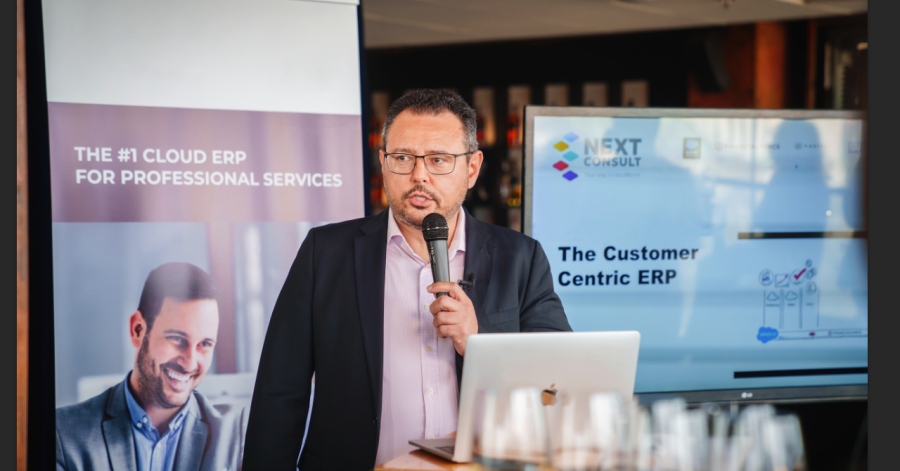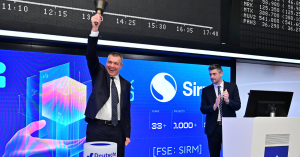Next Consult, known for its track record in digital and business transformation projects, is set to host an insightful event exploring the advances in automation and its significant role in the Professional and Business Services industry. This event is an opportunity for industry leaders and practitioners to understand how Certinia, previously known as FinancialForce, leverages its ERP solutions to foster business growth, streamline efficiency, and enhance data-centric decision-making.
Scheduled to occur on November 8, 2023, at 4:00 PM at the Hotel Marinela’s Vitosha Hall, this gathering promises to be an engaging conduit for knowledge exchange and networking. We managed to catch up with one of speakers at the event, Ivo Dreshkov, Certinia Discipline Lead at Next Consult, who shared some of the latest developments and trends in the industry.
The Recursive: How has the transition from FinancialForce to Certinia impacted the direction and focus of the ERP solutions offered by the company and respectively, Next Consult?
Ivo Dreshkov: The change of the name and the brand comes from the general repositioning. Back in time, FinancialForce was perceived as a financial system on top of the Salesforce platform, and now the key message is ‘The platform for services business.’ The point is that now Certinia can cover all the processes in a typical service company and, together with even richer Salesforce functionalities, it can be a single platform for the business. At the same time, more and more businesses are moving from commodity-driven to service-driven, which expands the reach on the market.
Many activities, once considered key for some businesses, are transformed as a service. For example, logistics – in the past, almost every company owned a warehouse and transport vehicles to take the goods they sell to the end customer, and now it’s just a service provided by a specialized company and, from their end, they are also a service company. Just think what most of the online shops need – a virtual storefront and a set of well-integrated services. The name itself comes from certainty, the word that is so important for the business when it comes to systems – all managers want to be certain where and how their data is gathered, how the processes run, and how the customers are serviced.
So this is in line with the goal of the company – to bring much more certainty into the business analysis and decisions. The core experience of the NextConsult team also came from the ERP/CRM world, and we are partnering with #1 vendors there – Salesforce and SAP. But SAP is a top offering for a typical manufacturing company with intensive material flows and capacity planning issues. While more and more companies are much simpler and lean and need a different type of system. This is where Certinia comes into the picture – to offer the complete solution covering financials, inventory, and project management, combined with the flexibility, reliability, and power of the Salesforce platform. And we believe it’s a unique offering on our market!
Can you elaborate on the key features of Certinia that set it apart from other ERP platforms in the market, especially in catering to the Professional and Business Services industry?
Certinia offers a set of features that most of the services businesses need, and the classic ERPs either do not cover or are very basic and hard to customize. The comprehensive and powerful module is the PSA (Professional Services Automation). Here we have all the elements of project management, starting from Services CPQ or the customized offering combined with price and resource estimation, project planning, resource planning, project execution, time and expense management, skill matching, scheduling optimization, and going down to billing. The next one is the Billing Contracts module, where we have the complete contract management, with a lot of flexibility out of the box and even more available using the platform features, generation of the billing events based both on external triggers or coming from the project’s milestones, generation of the billing documents, and conversion to sales invoices.
Another powerful module is the Revenue Recognition, where the revenue and the associated costs can be matched to their relevant periods to create a more accurate P&L statement. The issue is that both revenues and costs are invoiced for different periods, and the matching usually happens in the accounting manually or not at all. The Revenue Recognition module provides flexible templates definition to split and distribute each and every invoice to the relevant periods. For example, we may have an annual invoice for a subscription for our service and then monthly salaries, quarterly subcontracting invoices, and utilities bills that come a month later. All these can be aligned to get the right P&L picture of the company’s activities by month. To fill the loop, Certinia is also offering the Customer Success Cloud, which focuses on the processes around the contract renewal and keeping the customer happy.
The core of the system is the Financials module, where we have the full flexible accounting functionalities, Purchase requisitions and orders, inventory and warehouse management, barcode scanning, assembly/disassembly of BOMs, fixed assets, and recurring journals, sales orders, and cash management. Certinia also has a comprehensive document generation tool (coming from Conga at no cost) together with the standard Salesforce reporting engine. The Salesforce analytics functionalities with predefined datasets and lenses are also available. The standard Salesforce communities are expanded to cover the Certinia objects. As an official regional partner, Next Consult has developed the localization and translation for the Bulgarian market (VAT exports, INTRASTAT and VIES declarations, corresponding accounts, etc.). For more localizations, Certinia has a worldwide partner, Avalara, covering more than 100 countries’ local tax requirements. Also, all the additional applications from the Salesforce Appexchange (currently more than 4000) are available to the Certinia clients.
Could you share some success stories or case studies where Certinia’s implementation significantly benefited a client’s operational efficiency and profitability?
Currently, more than 1400 companies worldwide are benefiting from the Certinia solutions. Companies like RedHat, DXC, and DocuSign are using Certinia to manage their delivery projects and billing; companies like HP Enterprise, Siemens, Cisco, and Thales are utilizing Certinia in their support and maintenance organizations. Philips Healthcare and IQVIA are also managing their resources and projects in the healthcare industry, and last but not least, Salesforce itself is using the full stack – from project estimation, resource allocation, and program management, to contract management, billing, and invoicing. All these are well-known logos, but in fact, most of the customers are in the small to medium business area because of the system’s flexibility and affordability. In Bulgaria, we have several customers, but the most interesting one is NIK Electronics. We have a detailed movie about their case on our website.
What are the upcoming developments or enhancements in Certinia that businesses should look forward to? How do these align with the evolving demands of the Professional and Business Services industry?
As I mentioned, most of the businesses are transforming into a services business and even a company like Microsoft, which used to sell CDs and stickers, is now offering only subscriptions. This means that more and more businesses will move into this domain and they’ll need a software platform for their business. As a Leader in this area, Certinia is constantly developing its functionalities and features. They try to use the cutting-edge technologies to streamline and optimize business processes by leveraging AI, machine learning, generative chats, business analytics, etc. They also leverage all the Salesforce innovations in the platform and are also keeping Salesforce’s commitment for three releases per year, providing new features and benefits to their customers. The main focus in the next couple of releases will be to streamline the collaboration, to offer even richer functionalities in the mobile apps and to make the system even easier to use and to adopt by the end users.
So the hot topic for Certinia now is the so-called Pragmatic AI – an AI that reduces the risk of investing by providing curated datasets, closed-loop models and recommendations that improve model accuracy. Pragmatic AI is AI that focuses on real, tangible problems that businesses face today. It closes a loop through a virtuous cycle of capturing, aggregating, reasoning and surfacing data where people do work. Moreover, it is deployable with clear guidance on data, skill and digital maturity to ensure successful adoption and ROI.
In other words: Pragmatic AI targets real-world, current business problems rather than aspirational or flashy use cases. It gathers, processes and presents data in areas where people are doing work. It is user-friendly and designed for success, with measurable outcomes that help you calculate the return on your investment.
In Certinia it has 4 major cases:
– Improving predictable services delivery, which leads to increased CSAT (Customer Satisfaction), NPS (Net Promoter Score), and Project Margin %. The AI model analyzes past project performance, customer feedback, team dynamics, and external factors like industry trends to identify potential risks such as bottlenecks, resource allocation issues and even client dissatisfaction points before they happen. Based on these insights, services leaders can take proactive measures to reallocate resources, adjust project timelines and communicate transparently with clients, ensuring project success and client satisfaction.
– Optimizing resource allocation, which again leads to increased CSAT, NPS, and Margin %. The AI model analyzes historical data on resource allocation, and metrics associated with delivery success. It matches that with forward-looking data such as employee attributes and career goals to find the best consultant-project match across resource pools for your business, clients and employees.
– Improving services margins. The AI model analyzes historical data on resource allocation, time spent on each project phase and associated costs. It then suggests adjustments in resource allocation, project timelines or pricing structures to the packages on offer. As a result, the firm can optimize its services mix, focus on high-margin offerings and eliminate bottlenecks, leading to improved profitability. They can then build this into their headcount and other planning exercises to ensure upskilling and hiring to meet future demand.
– Predicting and minimizing days to pay, which leads to more accurate cash flow forecasting. The AI model analyzes past payment patterns, client behaviors, economic indicators, and other relevant data to forecast potential delays in payment and identifies clients who might extend their payment schedules. Armed with this information, the finance leader can implement targeted communication strategies to expedite payments or allocate resources accordingly, ensuring a stable, predictable cash flow.
All this works together with Salesforce AI – Einstein, which makes it even more powerful.
What advice would you give to businesses considering the adoption of Certinia? Are there any preparatory steps they should take to ensure a smooth transition and effective utilization?
Using Certinia is not that simple as buying a subscription and get access to the system. As all the ERP systems, the implementation is usually complicated and demands a lot of resources. Here also we apply the 6P principle (Proper Prior Preparation Prevents Poor Performance).
It requires a lot of change not only in processes but also in the mindset of the client. We usually advise the clients to use as much as possible the standard system functionality, but to keep their unique business advantages and know-how. First one we can do fast out of the box and the second one we’ll do using the rich customization options of the Salesforce platform. Also the customer commitment is crucial to the project success.
Many customers still think that buying an implementation project meant that the consultants will do all the job and they will get a new shiny system and they start using it like they are walking in a new furnished apartment. In reality it doesn’t work like this and most of the failed projects fail because of lask of customer commitment and mostly high management involvement. There is a lot of work that should be done by the customer – process changes, data preparation and cleansing, change in organization and responsibilities, proper staffing of the new positions and roles, etc. As we started as a management consulting company, we are also advising customers on all this and that highly improves the projects success rate.








